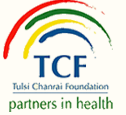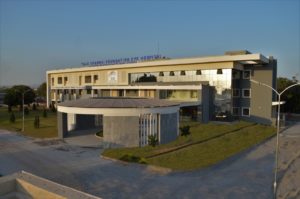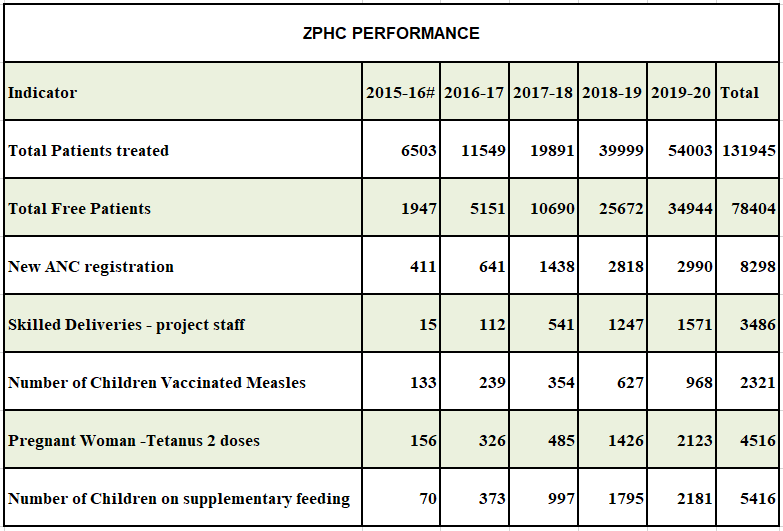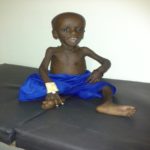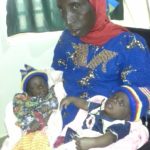The Challenge
Nigeria is the seventh most populous country in the world and the most populous in Africa, often referred to as the ‘Giant of Africa’ based on its population and economy. Despite emerging markets and a prosperous economy, it has an underdeveloped primary healthcare system. Infectious diseases, vector-borne diseases, maternal mortality, infant mortality, and malnutrition are the main public health challenges faced. It was reported that every year, approximately 58,000 young mothers die because of inaccessible and poor maternal health care services in Nigeria.
According to the Multi Indicator Cluster Survey 2016-17, 35% of women received no prenatal care, and more than half of new pregnant women received no skilled birth attendance. Almost 45% of recent births received no protection against neonatal tetanus. Only 23% of children between the ages of 12-23 months received all vaccinations as per the national program, indicating that many children are still vulnerable to preventable life-threatening diseases. In addition to the health challenges faced, the country is adding millions of people every decade, making Nigeria one of the fastest-growing populations globally.
With 5.8 live births per woman and a 2.6% annual population growth rate, Nigeria will reach 440 million people by 2050. The high maternal mortality rate (814/100,000 live births), infant mortality rate (70/1000 live births), and other poor development indicators, including the second largest population of people living with HIV globally, pose lifelong risks for young children and women in Nigeria. Given the current scenario and the catastrophic healthcare burden on individuals, families, and society as a whole, the future for the nation appears bleak. It is imperative to ensure the availability, accessibility, and affordability of quality healthcare services across the nation for a better tomorrow.
Our Approach
Increasing availability, accessibility and providing affordable primary health services across rural Nigeria through demonstrated, scalable PHC models.
Our Programs
The Mission for Primary Health programs are spread across the rural communities of Nigeria. The key objectives are:
- Reduce maternal and infant mortality in Nigeria.
- Increase immunization coverage for children against all vaccine preventable diseases.
- Reduce mal-nourishment among pregnant women and children.
- Prevent transmission of HIV/AIDS from infected mother to the new born child.
Current Programs
Yola South PHC Program:
Initiation:
- In Jan 2005, TCF signed an MoU with the Ministry of Health, Adamawa State Government, Yola South Local Government and Kewalram Foundation to implement the PHC Program in Yola South.
- The GD Chanrai Memorial Hospital (GDCMH) started operations from Dec 07, 2009.
- GDCMH offered services as a referral Centre to the health posts scattered in the three wards of Yola South LGA.
Services provided:
- Antenatal Care (ANC)
- Labor and Delivery Care
- Newborn Care
- PMTCT
Child Health Services
- Free curative services to the infants for prevalent diseases
- National Program on Immunization (NPI)
- Integrated Management of Neonatal and Childhood Illness (IMNCI)
- Growth monitoring and community-based management of severe and moderately acute malnutrition among children
Reproductive Health Services
- Family Planning and Counseling
Prevention and Control of Communicable Diseases
- STIs/HIV/AIDS Prevention and Control, Prevention and Control of Malaria, Prevention and Control of Diseases with Epidemic Potential
Consultation by qualified doctors.
- Prevention and Treatment
- Efficient and professional nursing services.
Infrastructure available:
- 24 hr. inpatient care with 17 Beds.
- Supports as a referral center for a Population of 29619
- Obstetric emergencies preparedness 24X7
- Management of neo-natal complications and referral to higher centre
- 24X7 free ambulance service for obstetric and infant cases
- In Patient management of complicated severely acute malnourished cases
- Medical laboratory – Malaria parasite screening, Typhoid screening, PCV, TB screening , Blood Glucose tests, HIV screening, Urine/stool microscopy and others
- 16 Health Posts with in house trained staff, rendering health promotive and preventive services related to maternal and child health at the doorstep
Project Coverage:
- Currently the PHC services are delivered through GDCMH & 16 health posts – A/Yangdam, Dingali, Doulabi, Dunga, Philngirgi, Jawro Bappa, Hullere, Kulung Bali, Meltara, Namtari Gurel, Rumde Mallum, Saminaka, Sengere, Walowal, Wuro Dole and Yolde Kohi
- The total population covered by the project is: ~30000, as enumerated by the TCF staff

Zaria PHC Program
Initiation:
- In June 2015, TCF signed an MoU with Zaria Local Government and Kewalram Foundation to implement the PHC Program in Zaria.
- The GK Chanrai Memorial Hospital (GKCMH) started operations from June 05, 2015..
- Initially, GKCMH offered PHC were during the day time and from Oct 24, 2016, started round the clock (24×7 functionality) services.
Services provided:
Maternal and Newborn Health Services
- Antenatal Care (ANC)
- Labor and Delivery Care
- Emergency Obstetric and Neonatal Care (EmONC)
- Newborn Care
- Maternal and Newborn Nutrition Malaria in pregnancy
- PMTCT
Child Health Services
- National Program on Immunization (NPI)
- Integrated Management of Neonatal and Childhood Illness (IMNCI)
- Child Nutrition
- Growth monitoring
- Infant and young child feeding, Identify, treat or refer cases of acute malnutrition
Reproductive Health Services
- Family Planning and Counseling
Prevention and Control of Communicable Diseases
- STIs/HIV/AIDS Prevention and Control, Prevention and Control of Malaria, Prevention and Control of Diseases with Epidemic Potential
Consultation by qualified doctors
- Prevention and Treatment
- Efficient and professional nursing services
Infrastructure available:
- 24 hr. inpatient care with 15 Beds
- Supports as a referral center for a Population of 35,000 (approx)
- Obstetric emergencies preparedness 24X7 with NAsg
- Management of neo-natal complications [incubator services for the neonates]
- Management of Grade 3 &4 Malnourished children
- Medical laboratory – Malaria parasite screening, Typhoid screening, PCV, TB screening, Blood Glucose tests, HIV screening, Urine/stool microscopy and others
- 24 hours Ambulance service
Project Coverage:
- Currently the PHC services are delivered through GKCMH & 4 health posts – Rafinfa and Tudun Kusa started in Nov 2017; Funganu and Ang. Malamai Dam started in Feb 2018.
- Dambo Ward- 32,416
- Facility Catchment Population:
- Dakace Village and other catchment areas.
- Approx. Population – 17,500 with around 24 settlements. (few settlements of Wucicciri ward bordering Dambo Ward are benefited)
Key Achievements:

